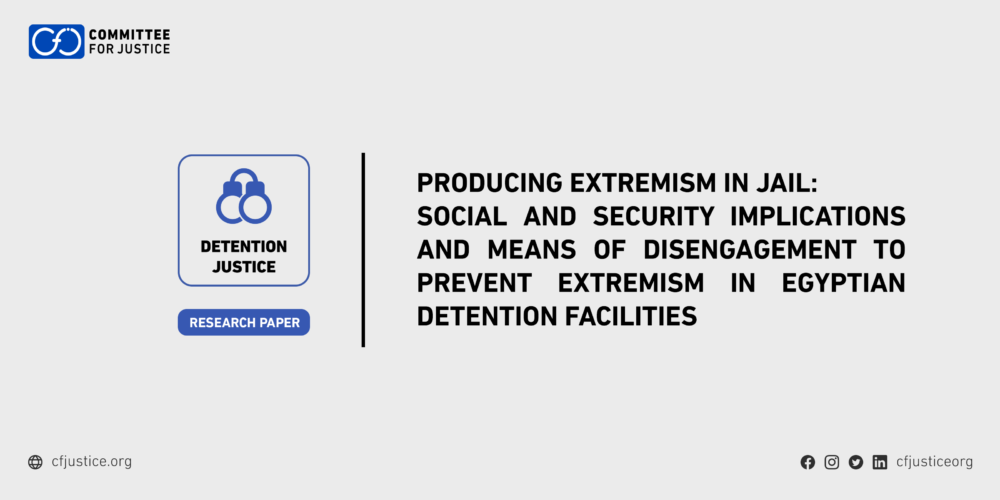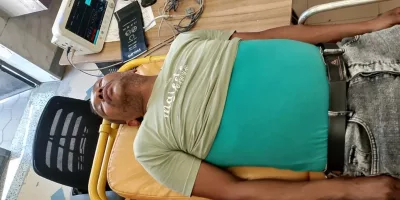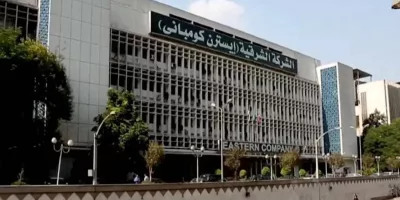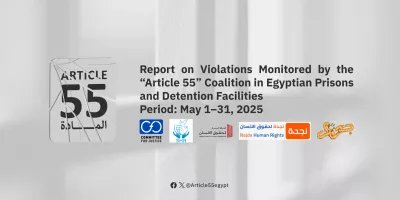The Committee for Justice (CFJ) highlighted in a new research paper how extremism is cultivated within Egyptian detention centers and prisons, and explores ways to address this problem.
The paper argued that injustice and extremism are two sides of the same coin. When injustice prevails, extremism finds a fertile ground for existence. Injustice is merely a result of the ruling authority overpowering the people, which paves the way for extensive space for extremism to thrive within society. Individuals who suffer from oppression and the denial of their basic human rights are more susceptible to being influenced by extremist ideologies.
The research paper, titled: Producing extremism in jail: Social and security implications and means of disengagement to prevent extremism in Egyptian detention facilities”, examines the connection between institutional corruption, fabrication of charges, unfair trials, torture, medical neglect, various forms of mistreatment, and the policy of overcrowding. This policy groups political prisoners, criminals, and extremists together in the same cells and wards. The research paper also delves into the processes of recruitment carried out by extremists.
The paper also reveals the social, human rights, and security consequences of the spread of extremism and recruitment operations within Egyptian prisons. It provides suggestions for ways to break this link and prevent and counter extremism. The paper observes the effects of the proliferation of recruitment activities carried out by takfiri and extremist individuals within Egyptian prisons.
The paper delves into the concept of extremism in previous literature, illustrating that extremism can manifest within some prisoners as individuals or groups harboring resentment towards individuals and state institutions due to the injustices, mistreatment, torture, and lack of recourse they’ve experienced.
The Egyptian state has since July 2013 sought to portray political Islam – specifically the Muslim Brotherhood – as the “extremist pole” within society. All acts of violence were linked to this portrayal to stigmatize and justify violence against its members. Later, anyone opposing the political system was added to the list of these accusations, not just those affiliated with political Islam.
The research paper establishes a connection between institutional corruption and the proliferation of extremism. As Egyptian state institutions strive to tighten their grip on the public sphere, unofficial relations and affiliations have emerged among executive institution officials, the Minister of Interior, prosecution deputies, heads of the National Security Agency, down to department heads and staff within security institutions. Attempts by the state to tighten its control extend to detention centers and prisons as well, where the supervision over the interactions between prison employees and detainees/prisoners has weakened. This is also true for the supervision over the interactions among the prisoners themselves. These are among the primary reasons for institutional corruption within detention centers, leading to the propagation of extremist ideologies within Egyptian prisons and detention facilities.
The paper also underscores that the authorities’ practice of “creating an enemy” with anyone who opposes them has given a green light to all institutions, particularly security agencies, to engage in repression, torture, arbitrary arrests, and to transform reform and rehabilitation facilities into institutions that lead detainees/prisoners into insanity, isolation, and death, rather than rehabilitating them to become productive citizens capable of reintegrating into society. This situation has made some detainees/prisoners more susceptible to extremist ideologies.
Similarly, the policy of co-placement pursued by the Egyptian authorities within prisons and detention centers, where political detainees are placed with individuals holding extremist beliefs, along with severe overcrowding in these facilities, has led prisoners to form subgroups competing for limited resources and social status within the prison. This is in addition to medical neglect, fabrication of charges, and biased convictions. All of this has driven many detainees/prisoners to a point of no return, making them more vulnerable to being influenced by extremist ideas.
The research paper also delves into the social and security consequences of the spread of extremism within prisons and detention centers. It emphasizes that the social stigma that follows detainees after their release, coupled with the security pressure and their need to belong to a group that shields them from societal disdain, drives individuals to join extremist ideological groups.
The research paper also addressed the social and security consequences of the spread of extremism within prisons and detention centers. It emphasized that the social stigma that follows detainees after their release, coupled with security pressures and their need to belong to a group that shields them from societal disdain, all contribute to individuals becoming ideologically drawn towards extremist groups.
The paper strongly emphasized that achieving justice, putting an end to the fabrication of charges and unfair trials, while respecting the minimum human rights standards in the treatment of prisoners within Egyptian detention facilities, as well as rehabilitating and training the personnel working within these facilities to view prisoners as victims, and rehabilitating detainees for reintegration into society – all of these factors will lead to preventing and countering the spread of extremism and recruitment within Egyptian detention centers and prisons.
In conclusion of the research paper, CFJ called for an end to all forms of mistreatment, torture, and other violations against prisoners and detainees. It demanded fair trials that provide justice for both political and criminal prisoners, along with criminalizing the charges against opponents and activists that have a political nature.
CFJ also urged the transfer of the Egyptian Prisons Authority’s jurisdiction from the Ministry of Interior to the Ministry of Justice, under independent supervision and monitoring by civil bodies. It stressed the need to halt arbitrary co-placement of detainees and prisoners, establish a mechanism for isolating extremist inmates from the rest, and implement a psychological and social rehabilitation process for extremist prisoners.
Furthermore, CFJ urged the Egyptian authorities to introduce reforms to their prison system, provide training for their personnel, and enact new legislation that aligns with the Minimum Rules for the Treatment of Prisoners.






